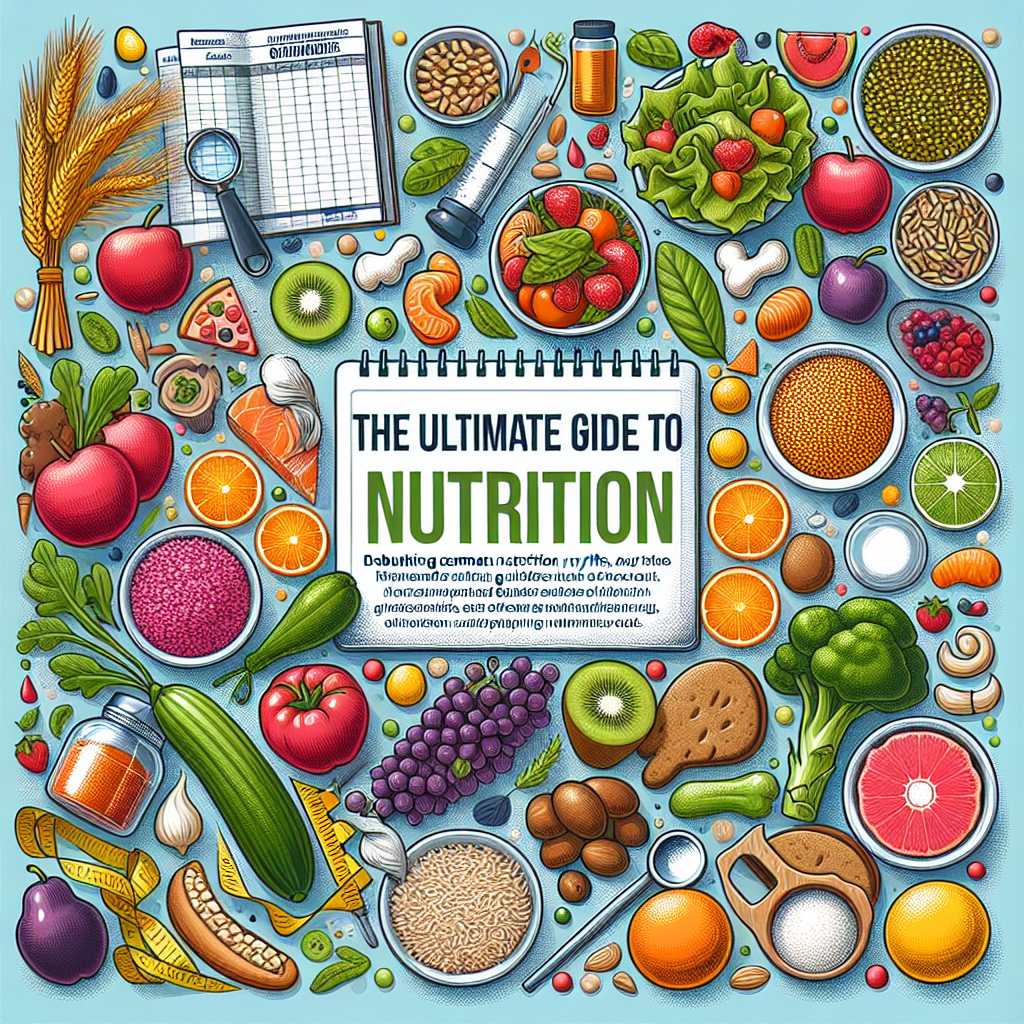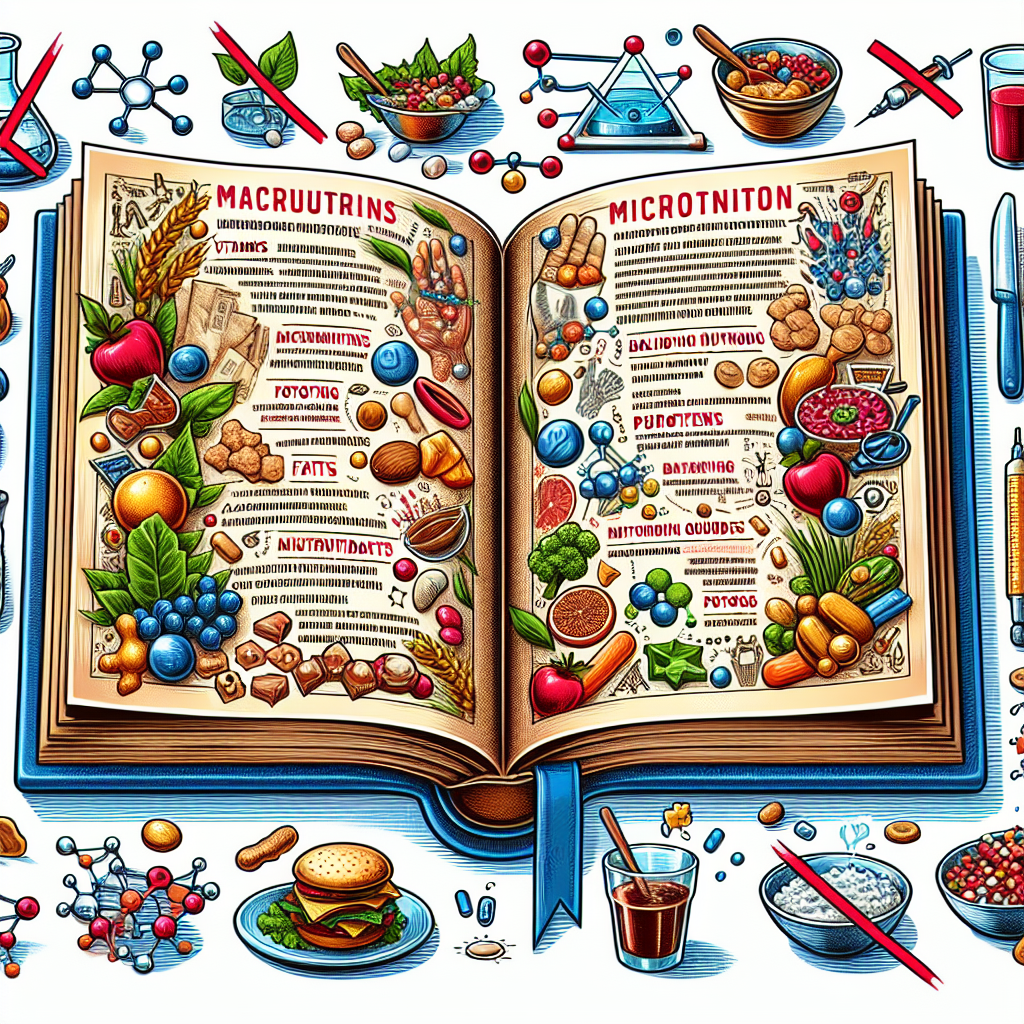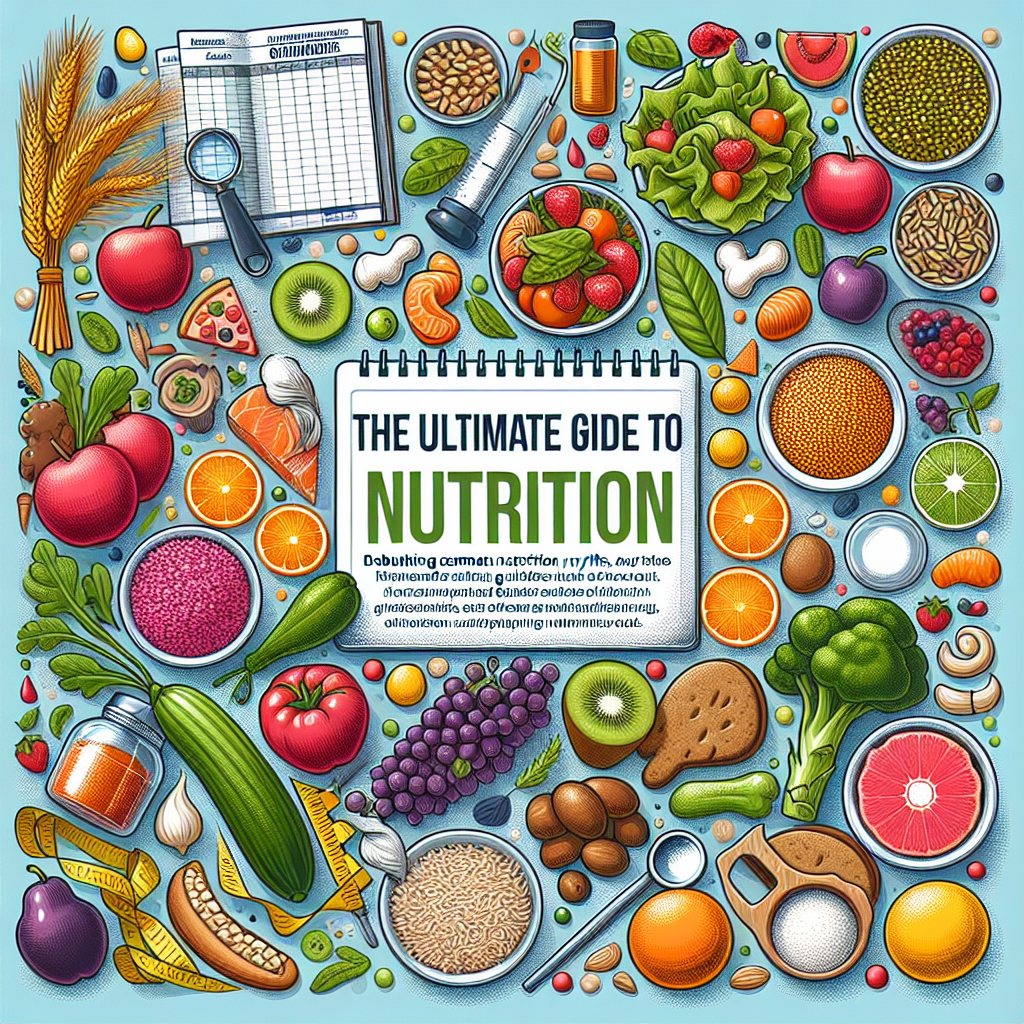In our pursuit of optimal health and well-being, understanding the intricate world of nutrition is paramount. With our new website, “The Ultimate Guide to Nutrition,” we aim to provide you with a comprehensive resource that delves deep into the realm of health and wellness. From deciphering the complexities of macronutrients to exploring the science behind nourishing our bodies, our goal is to equip you with the knowledge and tools necessary to make informed dietary choices. Whether you’re seeking weight management advice or interested in improving your overall vitality, we invite you to join us on this journey towards a healthier tomorrow.

What is Nutrition
Nutrition is the science and study of how food and nutrients affect our bodies and contribute to our overall health and well-being. It involves understanding the relationship between diet and diseases, as well as the process of food digestion, absorption, and metabolism in the body. A balanced and nutritious diet plays a vital role in maintaining optimum health and preventing various chronic diseases.
Definition of Nutrition
Nutrition can be defined as the process by which living organisms obtain the necessary nutrients from food for growth, development, and energy. These nutrients include carbohydrates, proteins, fats, vitamins, minerals, and water. Proper nutrition is essential for maintaining a healthy body and mind and supporting the body’s various physiological functions.
Importance of Nutrition
Good nutrition is essential for our bodies to function optimally. It provides the necessary energy and nutrients for growth, development, and repair of tissues. Adequate nutrition is crucial for maintaining a healthy weight, boosting the immune system, improving cognitive function, and reducing the risk of chronic diseases such as heart disease, diabetes, and cancer. A well-balanced diet also helps in maintaining healthy skin, hair, and nails, promotes good digestion, and supports overall well-being.
Components of Nutrition
Nutrition comprises various components, including macronutrients, micronutrients, water, and calories. Macronutrients are the nutrients required in larger quantities and include carbohydrates, proteins, and fats. Micronutrients are essential in smaller amounts and include vitamins and minerals. Water is a vital component of nutrition as it is involved in numerous biochemical reactions in the body. Calories represent the energy content of the food we consume and play a significant role in maintaining energy balance.
Macronutrients
Macronutrients are the main nutrients needed by the body in large quantities to provide energy and support essential functions. They include carbohydrates, proteins, and fats.
Carbohydrates
Carbohydrates are the body’s preferred source of energy. They are found in foods such as grains, fruits, vegetables, and legumes. Carbohydrates can be categorized into simple carbohydrates (sugars) and complex carbohydrates (starches and fibers). They are broken down into glucose, which is used by cells to produce energy. Carbohydrates also play a role in regulating blood sugar levels and supporting brain function.
Proteins
Proteins are essential for growth, repair, and maintenance of body tissues. They are made up of amino acids and can be found in animal-based foods such as meat, poultry, fish, dairy products, as well as plant-based sources like legumes, nuts, and seeds. Proteins play a crucial role in building and repairing muscles, producing enzymes and hormones, supporting immune function, and transporting molecules within the body.
Fats
Contrary to popular belief, fats are an important part of a healthy diet. They are a concentrated source of energy and provide essential fatty acids that are necessary for various bodily functions. Fats can be categorized into saturated fats, trans fats, monounsaturated fats, and polyunsaturated fats. Healthy sources of fats include avocados, nuts, seeds, olive oil, and fatty fish. However, it is important to consume fats in moderation as they are high in calories.
Micronutrients
While macronutrients provide the body with energy, micronutrients are required in smaller quantities and are essential for various physiological processes.
Vitamins
Vitamins are organic compounds that are essential for normal growth, development, and overall health. They are classified into two categories: water-soluble vitamins (vitamin C and B-complex vitamins) and fat-soluble vitamins (vitamins A, D, E, and K). Each vitamin has specific functions and plays a crucial role in maintaining the proper functioning of various systems in the body.
Minerals
Minerals are inorganic substances that are necessary for the proper functioning of the body. They are involved in various physiological processes, including bone health, nerve function, energy production, and enzyme activity. Common minerals include calcium, iron, magnesium, potassium, and zinc. These can be obtained from a balanced diet that includes a variety of fruits, vegetables, whole grains, and lean sources of protein.
Water and Hydration
Water is often overlooked but is essential for maintaining good health. It is involved in almost every bodily function and makes up a significant percentage of our body weight.
Importance of Water
Water plays a vital role in regulating body temperature, lubricating joints, transporting nutrients and waste products, and assisting in digestion. It is also important for maintaining healthy skin, promoting proper kidney function, and supporting overall cellular health. Dehydration can lead to fatigue, dizziness, headaches, and impaired cognitive function.
Daily Water Intake
The daily water intake requirement varies depending on several factors, including age, activity level, climate, and overall health. As a general guideline, it is recommended to consume at least eight 8-ounce glasses of water per day, which is equivalent to about 2 liters or half a gallon. However, individual needs may vary, and it is important to listen to your body’s thirst cues and drink enough water to stay hydrated.
Hydration Tips
- Carry a reusable water bottle with you at all times to ensure easy access to water throughout the day.
- Drink water before, during, and after physical activity to replenish fluids lost through sweat.
- Include hydrating foods in your diet, such as fruits and vegetables with high water content, like watermelon, cucumbers, and oranges.
- Limit the intake of sugary drinks and opt for water as the primary source of hydration.

Calories and Energy Balance
Calories are a measure of the energy content of food. Achieving and maintaining energy balance is crucial for maintaining a healthy weight and overall well-being.
Basal Metabolic Rate (BMR)
The Basal Metabolic Rate (BMR) is the number of calories your body needs to perform basic functions at rest, such as breathing, circulating blood, and regulating body temperature. It represents the minimum number of calories required to sustain life.
Total Daily Energy Expenditure (TDEE)
Total Daily Energy Expenditure (TDEE) takes into account your BMR and factors in physical activity levels to determine the total calories needed to maintain weight. It is influenced by factors such as age, sex, weight, height, and activity level.
Calorie Intake and Weight Management
To lose weight, a calorie deficit is required, which means consuming fewer calories than your body needs. Conversely, to gain weight, a calorie surplus is needed. It is important to strike a balance and ensure that the calories consumed come from a variety of nutrient-dense foods.
Healthy Eating Patterns
While there is no one-size-fits-all approach to healthy eating, several eating patterns have been shown to promote overall health and reduce the risk of chronic diseases.
Mediterranean Diet
The Mediterranean diet is inspired by the traditional dietary patterns of countries bordering the Mediterranean Sea. It emphasizes whole, minimally processed foods such as fruits, vegetables, whole grains, legumes, nuts, seeds, olive oil, and lean sources of protein like fish and poultry. It also encourages moderate consumption of dairy products and red wine in moderation.
Plant-Based Diets
Plant-based diets focus on whole, plant-based foods such as fruits, vegetables, whole grains, legumes, nuts, and seeds while minimizing or eliminating animal products. Plant-based diets can provide all the necessary nutrients, including protein, when properly planned and can be beneficial for overall health and reducing the risk of chronic diseases.
DASH Diet
The Dietary Approaches to Stop Hypertension (DASH) diet is specifically designed to help lower blood pressure. It emphasizes a diet rich in fruits, vegetables, whole grains, lean protein, and low-fat dairy products while limiting sodium, saturated fats, and added sugars. The DASH diet is supported by extensive research and has been shown to help reduce blood pressure and improve overall cardiovascular health.
Ketogenic Diet
The ketogenic diet is a high-fat, low-carbohydrate diet that aims to transition the body into a state of ketosis, where it primarily uses fat for fuel instead of carbohydrates. This diet has gained popularity for weight loss purposes, but its long-term effects and sustainability are still being researched. It is important to consult with a healthcare professional before starting any restrictive diet.
Intermittent Fasting
Intermittent fasting involves cycling between periods of fasting and eating. There are various methods, such as the 16/8 method (fasting for 16 hours and eating within an 8-hour window) or alternate-day fasting. It may help with weight loss, blood sugar control, and other health benefits. However, it is not suitable for everyone, and it is important to listen to your body and consult with a healthcare professional before trying intermittent fasting.
How to Read Food Labels
Understanding food labels is essential for making informed choices about the foods we consume. Here are key elements to look for when reading food labels:
Serving Size
The serving size indicates the amount of food or drink typically consumed at one time. It is important to compare the serving size listed to the amount you actually consume to accurately assess the nutritional content.
Calories per Serving
Calories represent the energy content of a food or beverage. Pay attention to the calories per serving and consider it in the context of your overall calorie intake for the day.
Nutrient Information
Food labels provide information on various nutrients, including macronutrients (carbohydrates, proteins, and fats), vitamins, minerals, and fiber. Look for the amounts and percentages of each nutrient to make informed choices based on your dietary needs.
Ingredients List
The ingredients list provides valuable information about the contents of the food product. Ingredients are listed in descending order by weight, so the first few ingredients are the most significant. Avoid foods that list unhealthy ingredients such as added sugars, trans fats, and artificial additives.
Food Groups and Dietary Guidelines
The concept of food groups helps ensure a balanced and nutrient-rich diet. Dietary guidelines provide recommendations for the consumption of different food groups.
Fruits and Vegetables
Fruits and vegetables are rich in essential vitamins, minerals, fiber, and antioxidants. Aim to include a variety of colorful fruits and vegetables in your daily diet to ensure a diverse range of nutrients.
Grains
Grains provide carbohydrates, fiber, vitamins, and minerals. Opt for whole grains, such as brown rice, quinoa, whole wheat bread, and oats, as they are less processed and contain more nutrients compared to refined grains.
Protein
Protein is important for building and repairing tissues, supporting immune function, and producing enzymes and hormones. Choose lean sources of protein such as poultry, fish, eggs, legumes, and tofu.
Dairy
Dairy products, such as milk, yogurt, and cheese, are excellent sources of calcium, vitamins, and protein. Opt for low-fat or fat-free options and consider alternatives like fortified plant-based milks if you are lactose intolerant or follow a vegan diet.
Oils and Fats
Oils and fats provide essential fatty acids and fat-soluble vitamins. Choose healthy fats such as olive oil, avocado oil, nuts, seeds, and fatty fish while limiting saturated fats and trans fats.
Balanced Diet
A balanced diet involves consuming a variety of foods from all food groups in the right proportions. It ensures that the body receives all the necessary nutrients for optimal health and well-being.
Meal Planning and Prepping
Meal planning and prepping can be valuable tools for maintaining a healthy diet consistently.
Benefits of Meal Planning
Meal planning allows you to make healthier choices, save time and money, reduce food waste, and avoid impulsive food decisions. It helps you stay organized, ensures a balanced and nutritious intake, and makes it easier to achieve your health goals.
Creating a Weekly Meal Plan
When creating a weekly meal plan, consider your dietary needs, food preferences, and schedule. Plan meals that contain a variety of foods from each food group and consider batch cooking to save time during the week.
Meal Prepping Techniques
Meal prepping involves preparing and cooking meals or ingredients ahead of time to save time and make healthy choices more convenient. Techniques include batch cooking, pre-cutting vegetables, packing lunches in advance, and portioning out meals for the week.
Healthy Snack Ideas
Choose nutrient-dense snacks that provide a combination of carbohydrates, protein, and healthy fats. Some healthy snack ideas include Greek yogurt with berries, carrot sticks with hummus, almonds, apple slices with nut butter, or homemade energy balls.
Common Nutritional Myths Debunked
Nutrition is a complex field, and there are numerous myths and misconceptions surrounding it. Here are some common myths debunked:
Myth 1: Carbs are Bad for You
Carbohydrates are an essential nutrient and a primary source of energy for the body. The key is to choose complex carbohydrates from whole grains, fruits, vegetables, and legumes while limiting refined and processed carbohydrates.
Myth 2: All Fats are Unhealthy
Fats are important for a healthy diet as they provide energy, support cell growth, and protect organs. Choose healthy fats from sources such as avocados, nuts, seeds, and olive oil while limiting saturated and trans fats.
Myth 3: Detox Diets are Effective
Detox diets claim to eliminate toxins from the body and promote weight loss. However, the body has its own built-in detoxification systems, and there is little scientific evidence to support the effectiveness of detox diets. Instead, focus on a balanced diet rich in whole, minimally processed foods to support the body’s natural detoxification processes.
Myth 4: Organic Food is Always Healthier
While organic food may be free of synthetic pesticides and genetic modifications, it is not necessarily more nutritious than conventionally grown food. The nutritional content of food can vary depending on various factors such as soil quality and cultivation practices. Focus on a balanced diet with a variety of fruits, vegetables, whole grains, and lean proteins, whether they are organic or not.
Myth 5: Supplements Can Replace a Healthy Diet
While supplements can be useful for certain individuals with specific nutrient needs, they should not replace a healthy and balanced diet. Whole foods contain a complex mix of nutrients, fiber, and other beneficial compounds that cannot be replicated by supplements alone. It is best to obtain nutrients from a well-rounded diet and consult with healthcare professionals before starting any supplements.
In conclusion, nutrition is a vital component of overall health and well-being. It involves understanding the nutrients our bodies need, making informed food choices, and maintaining a balanced and varied diet. By focusing on macronutrients, micronutrients, water and hydration, calories and energy balance, healthy eating patterns, food labels, food groups, meal planning and prepping, and debunking common nutritional myths, we can optimize our nutrition and support a healthy lifestyle. Remember, nutrition is an ongoing journey, and it is important to listen to our bodies and make choices that align with our individual needs and goals.

